Das, R. J., Latham, R. and Fasenfest, D. 2026. The Power of Marxist Thought. Leiden/Boston: Brill.
Das, R. J. 2025. Theories for Radical Change: Key Texts from the Political Economy of Marx and Lenin. Leiden/Boston: Brill.
Brass, T. and Das, R. J. 2024 (eds). Interrogating the Future: Essays in Honour of David Fasenfest. Leiden/Boston: Brill.
Das, R. J., Gough, J., and Eisenschitz, A. 2023. The Challenges of the New Social Democracy: Social Capital and Civic Association or Class Struggle?. Leiden/Boston: Leiden/Boston: Brill.
This book presents a critical approach towards what it calls ‘new social democracy’. In both the global North and South, new social democracy (NSD) is seen by many scholars and policy makers as the dominant strategy for local economic and social development. The NSD strategy seeks to build social capital, strengthen civil society, build not-for-profit enterprises, encourage self-help, and foster community ties. It seeks participatory forms of local politics and promises to improve people’s economic and social conditions in the face of neoliberal capitalism. This book argues that the NSD strategy is severely limited by, and internalises, its capitalist environment. It shows that social enterprises, within limits, can be developed in socialist ways, and contribute to a local politics based in class struggle. But social capital and other such strategies at the site of ‘civil society’ cannot replace the struggle of the exploited and oppressed against capitalism and for a socialist society. This alternative strategy must pay attention to the importance of the local scale.
Das, R. J. 2023. Contradictions of Capitalist Society and Culture: Dialectics of Love and Lying. Leiden/Boston: Brill.
Love and truth are important aspects of culture. Signifying the crisis of capitalist culture in the contemporary world, lying for ideological/political purposes is rampant, and there is an absence of genuine love (love as caring, solidarity, etc., which, under certain conditions, can take romantic forms). Lying and corruption of love are connected. Capitalism resorts to lying to cover up its contradictions that cause suffering of the masses, which undermines conditions for genuine love. The right-wing politics of lying (‘post-truth’), as a consequence of capitalist crisis, is also a politics of hatred (anti-love or ‘post-love’) against minorities, democrats and communists, justified by lies about them. The fight against hate-politics and post-truth politics must be part of the fight for a post-capitalist world (socialism), imagined as a truthful and caring world.
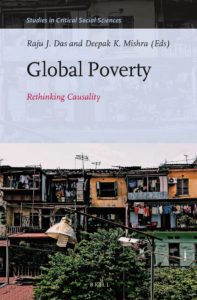 Das, R. and Mishra, D., Eds. 2023. Global Poverty: Rethinking Causality. Leiden: Brill.
Das, R. and Mishra, D., Eds. 2023. Global Poverty: Rethinking Causality. Leiden: Brill.
Much ink has been spilled on poverty measurements and trends, at the expense of revealing causality. Assembling multi-disciplinary and international contributions, this book shows that a causal understanding of poverty in rich and poor countries is essential. That understanding must be based on a critical interrogation of the wider social relations which set up the mechanisms producing poverty as an outcome. Processes that widen/strengthen crisis-ridden market relations, that increase income/wealth inequality, and that ‘enhance’ the policy-biases of nation-states and international institutions toward the affluent-propertied strata cause global poverty and undermine poor people’s political power. The processes concentrating wealth-creation are poverty-causing processes. Through theoretical and empirical analyses this volume offers important insights and political prescriptions to address global poverty.
 Das, R. J. 2022. Marx’s Capital, Capitalism and Limits to the State: Theoretical Considerations. Routledge. 360 pages.
Das, R. J. 2022. Marx’s Capital, Capitalism and Limits to the State: Theoretical Considerations. Routledge. 360 pages.
Marx’s Capital examines the capitalist state in the abstract, and as it exists in advanced capitalism and peripheral capitalism, illustrating the ideas with evidence from the North and the South.
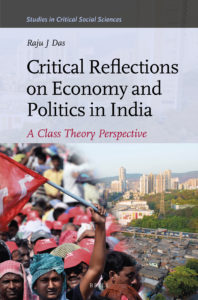 Das, R. J. 2020. Critical Reflections on Economics and Politics in India: A Class Theory Perspective. Leiden/Boston: Brill. 658 pages.
Das, R. J. 2020. Critical Reflections on Economics and Politics in India: A Class Theory Perspective. Leiden/Boston: Brill. 658 pages.
This book presents a class-based theoretical perspective on the economic and political situation in contemporary India in a globalizing world. It deals with the specificities of India’s (peripheral) capitalism and neoliberalism, as well as poverty/inequality, geographically uneven development, technological change, and export-oriented, nature-dependent, low-wage capitalist production. The book also deals with Left-led struggles in the form of the Maoist movement and trade-union strikes, and presents a critique of the Left. It also discusses the politics of the Right expressed as fascistic tendencies, and the question of what is to be done to fight these.
This book is published in two volumes by Haymarket (Chicago) in 2021: Volume 1, Volume 2.
Reviews and Endorsements
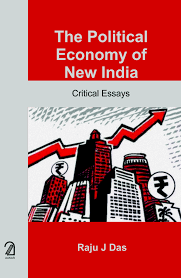 Das, R. J. 2020. The Political Economy of New India: Critical Essays.
Das, R. J. 2020. The Political Economy of New India: Critical Essays.
Delhi: Aakar. 204 pages.
Critical of economic and political power relations, and written for the broader public, the essays in this book provide commentaries on different aspects of Indian society, including: agrarian crisis and immiserization; suicide committed by indebted farmers; free-market economic policy and its implications for economic development; class character of poverty; institutional biases of the state in favour of the propertied classes; the state of democracy; the religious Right; protests against dispossession; importance of progressive culture, and Left politics.
This book is also published by Routledge, in 2021, for the readers outside of South Asia:
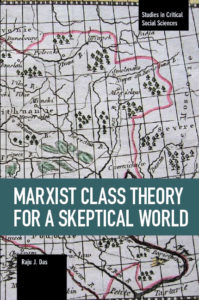 Das, R. J. 2018. Marxist Class Theory for a Skeptical World. Chicago: Haymarket. 684 pages.
Das, R. J. 2018. Marxist Class Theory for a Skeptical World. Chicago: Haymarket. 684 pages.
This is the paperback edition of:
Das, R. J. 2017. Marxist Class Theory for a Skeptical World. Leiden/Boston: Brill. 684 pages.
This book presents a critique of influential ideas (from analytical Marxism and anti-essentialist or post-modernist Marxism) in class theory. It then provides a philosophical foundation for class theory, on the basis of which it theorizes class at three levels of generality: class society as such; class as it exists under capitalism in the abstract; and class in specific forms of capitalist society (e.g. class in under-developed capitalism). Class in capitalism is dealt with from the vantage points of the objective relations within the ‘economic’ sphere, and the state, as well as in terms of consciousness and political action. An internal relation between class exploitation and political oppression by the state is established to provide a non-economistic conceptualization of class. The approach to class advanced in the book is simultaneously materialist, dialectical and internationalist. The book also talks about how unequal class relations connect to not only oppressive state-citizen relations but also gender and race/caste relations, and deals with the questions surrounding fragmentation—differences—within the working class.
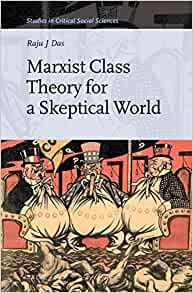 Reviews and Endorsements:
Reviews and Endorsements:
- Brill
- Capital and Class (44:3, 2020)
- Science & Society: A Journal of Marxist Thought and Analysis (84:4, 545–554; a review essay on the book).
- International Socialism: A Quarterly Review of Socialist theory (Issue no. 160, year 2018)
- Journal of International and Global Studies (10:1, year 2018)
- Nouveaux Cahiers du socialisme
 Das, R. J. 2014. A Contribution to the Critique of Contemporary Capitalism: Theoretical and International Perspectives. New York: Nova Science Publishers. 213 pages. Paperback edition in 2015.
Das, R. J. 2014. A Contribution to the Critique of Contemporary Capitalism: Theoretical and International Perspectives. New York: Nova Science Publishers. 213 pages. Paperback edition in 2015.
This book discusses the nature of social critique, and of Marxism as a form of social critique. It employs the principles of Marxist theory-as-critique to shed light on a set of conceptual issues, which signify different dimensions of capitalist society, including: nature of the state, unfree labor, protest politics, agrarian change, limits to political and social democracy (in India), and pharmaceutical fraud and industrial accidents (in the USA).
Reviews and Endorsements:
- Nova Publishers
- Capital and class (39:2, year 2015)

